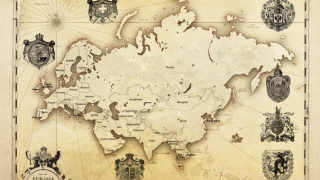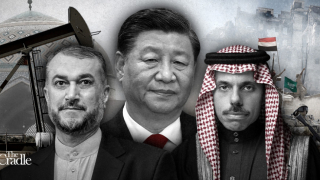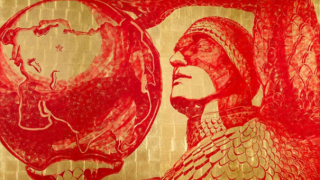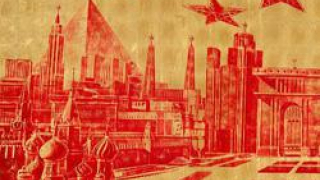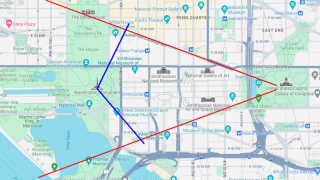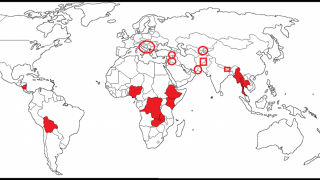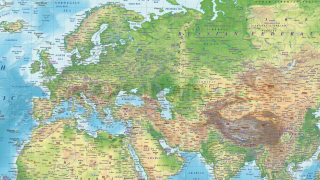Slavdom and the Question of Eurasia
I. ON THE QUESTION OF SLAVIC IDENTITY AND HISTORICAL CURRENTS OF SLAVONIC NATIONALISM AND PALIGENESIS VERSUS THE ROMANO-GERMAN NUCLEUS AND WORLD
The question of Slavophilia, and the question of the future of Slavdom, are intimately tied within the background of cultural and broad civilization struggle that must underlie the new paradigms that Neo-Eurasianism has in stock for us.
Slavic civilization has never been fully “Western”. That is because we, besides being one of the last European peoples to abandon our traditional pagan social mores, religion, and customs, we also never fully fell into the orbit of the Latin West as did the nations that emerged out of the ancient, traditional Frankish Empire of Charlemagne and his successors.
It is perhaps no coincidence that the chief elements of what would constitute the primordial Western civilization, nurtured under Roman and Germanic law, have never been fully subject to the institutes of the Latin Church. Neither have us. By definition we can also argue that our character, our essence as an ethnos, as a narod, was also deeply marked by elements that have never been strictly Romano-Germanic, or even Byzantine, but rather constituted our own essential character as a people suffused with a peculiar anti-individualistic ethos, a certain particular pagan metaphysical view, and a certain geist. This has been a peculiar mark of ours until very recent times.
By not tying itself to the Franco-Latin civil and religious paradigms, we have been very distinct in our ways. And this distinction is very acutely marked by Romano-Germanic writers themselves, esp. those of the pan-German nationalistic strands. It was said in the 18th century that the “civilized world” - as understood within the peculiar frame of the Romano-German mentality – and broadly reflecting the prejudices of the time that are still current, even if elusive, in the current Western perception of “Eastern” European space – it was said that “Civilization”, already in a typically modern understanding, ended in Vienna, and that everything East of this city did not constitute it as such. This prejudice remains today, in the aforementioned classification of “Western European” vs. “Eastern European” space, where most of Slavic civilization is located.
These classifications can reveal to us, broadly, the dichotomies and broad differences that give us the case for a conflict of civilizations.
And while we must notice that some relevant figures, like Frantisek Palacky, Ludovit Stur, Mikhail Skobelev, Pavel Josef Safarik, the Slavophiles of old – Kireyevsky, Khomyakov, Aksakov – as well as others have noticed during their respective times, it must be known that as early as the days of Cyrilus and Methodius this division was widely felt in the world of Slavdom and the proto-Slavic tribes.
The Glagolithic Alphabet, the Byzantine Church, the old Slavonic language and the liturgies which it conveyed through most of the Orthodox world before and after the advent of Muscovy as Third Rome, all have demonstrated the objective existence of a pole of Slavdom that was opposite to the pole of Latinitas, of the Roman Church, and of the medieval Western world that would serve as the basis for the current modern liberal civilization. And it should have been, at least in my vision, the sort of idea, the sort of nucleus around which Slavdom could have fully, instead of just partially, converged to – had it the strength to discern itself as a separate civilization, to distance itself from the Romano-German spirit, and to converge itself in fundamental union around the nucleus of a common civilization built by characteristically Eastern Slavic values and influenced more deeply by Byzantinism, in the molds best expressed by Konstantin Leontiev.
For those Slavic peoples of the West, like the Wends, the Czecho-Slovaks, the Slovenians, Croats, the Carantanians, and even the Poles, it would have been decisive IF and only if the common civilization goal was shared with Byzantium, with Cyrilus and Methodius, and with their Eastern Slavic brothers – as a firm contrast of identity and purpose with the Franco-Latin West and the Germanic Holy Roman Empire. And also, of civilization, and institutional, foundations, and of spirit.
As such, we might understand the admixture and conflict between “West” and “East” to have been since times primordial a fundamental characteristic of the very bosom of Slavdom.
Or as Frantisek Palacky would say it, through a deep-seated resentment, shock and conflict between the Slavonic and the Romano-German element. While at times the Romano German element was dominant, in its civil, religious, moral and cosmological sphere, we have never gotten rid of the essential substratum that set us apart as a people with our own different and inherent logos and unity. It is not only in the Slavophiles, but also in Palacky, L. Stur, as well as in Orthodox and South Slavic anti-Westernism, that our own distinct character evinces itself through different times in history.
This identity, and the conflicts and dichotomies around it, are the sort of element that fully conditions our own mentality as a people. And this identity is also brings together our own essence as a narod – that in the current day, the current age, finds itself most prepared to fulfill the task of Eurasianism, and of the challenges that are imposed on the creation of traditional civilization and the preservation of fundamental ethnic and cultural identity in the 21st century. This problem must also, then, be tackled with strict reference to the problem of Western decadence, and the passing out of Western and liberal hegemony and also of the Eurocentrism that has been dominant since 1500, together with the advent of newer global powers like China, India, the rebirth of Russia, Turkey and its search for a new identity, and so on.
The essence of the problem, posed by Kireyevsky, Leontiev, Danilevsky, Stur and other Romantics long ago, consists then in the synthesis of authentic Orthodoxy and Slavdom – and this element and its prevailing problematic are still decisive in our day and in our age. As well as, let us argue, the re framing of these dilemmas of ancient Slavdom and romantic Slavophilia into contemporary Turkic and Slavic Eurasianity. We can also argue concisely that Nikolay Trubetzkoy has only been the last of a long line of writers of a specific Russian, or pan-Slavic bent, to embody, to discern, and to continue this fundamental antithesis, and to criticize the foundations of the late technocratic West.
The proposal of Eurasianism in the 21st century must tackle the challenges of the post-modern space while being acutely conscious of the needs that pertain to the formulation of a paradigm of civilization that is radically new.
As such, while the paradigms of the bourgeois world, the bourgeois era and its typical mentality can be useful as a reference of useful ideological predecessors to the Neo-Eurasian movement, they can only serve at best as past references, and that the best way to adapt the old dilemmas posed by these paradigms is through the work that has so far been done to conceive the Neo-Eurasian idea.
II – THE SPIRITUAL QUESTION AND THE NEED FOR A 4TH POLITICAL THEORY TO OBTAIN SPIRITUAL RECOVERY
It should be added that as a result of its lack of inherent legal frame, the Christian religion represented a paradigm that depends mostly upon the strength of powerful secular authorities to retain its sacred foothold and its sway and effective strength over the minds of peoples. As the West has become an anti-traditional civilization, founded upon secular and nihilistic liberalism, Christianity has become sidelined by secular concerns and secular intellects. The old foundation of Roman Law, Thomism, and so on, cannot provide the framework for a restoration of a Sacred Empire, but can only at best work as a reference point.
Rather, what is at stake is that Christianity, lacking an inherent spirit, an inherent legal and moral framework as clearly established as in Judaism, Islam or even the Vedas, it is only too logical that Christianity has a deep need for the 4th political theory, or it will succumb precisely to the emptiness which the Baron Evola has emphatically denounced. By lacking a fundamental legal, social and moral framework – mostly found on Eastern exotericism and its embodiment in the Sharia, the Dharma, and also Confucianism, Christianity must necessarily cannibalize the foundations of a strong State with strong innate secular Conservative law in order to survive.
And we must add that while the triumph of modern ideology in the East has created room for the radical sidelining of their traditional backgrounds and their exoteric doctrines, it was still the absence of a Law in Christianity that has constituted in itself a critical, if not truly decisive shortcoming, and that this might be adduced as one of the chief ways in which the Modern World developed, through its fundamental gaps.
Once again returning to Leontiev, Danilevsky, Spengler – they have bequeathed us a legacy of a circular view of history and a fundamentally anti-liberal and anti-socialist ethos. Their historical and critical analysis work as a living refutation of liberal progressive-ism and linearity, and do much justice to the cosmological conceptions of different civilizations. They present a fundamental key towards the overcoming of the present day liberal paradigm, and it is easy to see their deep-seated affinity with the Traditional doctrines of the East, including even Islam, and also, Platonism. Their work is valuable, and consists into a perfect refutation of the paradigms of the Post-Modern world.
The false ideas of liberal universality can only be countered by the authentic ideas of Traditional universality. Only these ideas, so far, have been able to shape entire civilizations effectively, and lead them through their Golden Age. The forgetfulness of the metaphysical dimension, conveyed by Traditional doctrines, is one of the key aspects through which these societies degenerate, and finally, disintegrate.
Conversely, it must be true that absent the dimension of Roman Law, and Byzantinism, the only thing that can sustain the sacred aspect of Christianity in the heart of Slavdom is the Fourth Political Theory, more than any half-hearten “Conservatism”, “Reactionism”, or even worse, “Liberalism” in its crude and pure dimension. The advent of the Eurasian Empire, must necessarily work as a paradigm through which the restoration of the Christian ethos can proceed, without the degeneracy of the modern world. Without this restoration, and it will be subject to the same problems as Liberalism itself, losing its gravity, its moral authority, its dimension, and becoming in itself, an ineffective spiritual medium, secularized and rendered pointless by the paradigms of so-called “Enlightened” humanity within nihilistic post-modernity.
III – THE TASK AT HAND
As I have outlined before, and might outline again, for decades and even centuries the historical mission of the Slavic narod has been unfolding. And it might happen perhaps that in the very 21st century, that the fundamental prophecy of the late and great Arthur Moeller van den Brueck, that Russia herself, or the Eurasian Empire as a hypothetical surrogate, might finally fulfill the fundamental role of reversing in all of Europe, the nefarious effects and the malicious scope that have been a legacy of the French Revolution. As intellectual sons of the Conservative Revolution, we must agree with that completely.
With this in mind, we must by all means proceed with the task at hand. As long as we can still resist Liberal values and Liberal hegemony, as long as we preserve our essence as an ethnos, as a narod, and also as a culture – face the fundamental onslaught of values coming from the postmodern West that are deeply detrimental to us. And the 4th Political Theory will come as a necessary deliverance against the postmodern spirit and its innate moral and social degeneracy, while also serving as a tool of civilizing and spiritual renewal.
We cannot achieve this alone, but rather, we must unite ourselves around the our common heritage, our common destiny, our common essence. We shall couple this act with a fundamental longing for a better future, overcoming the bounds of past prejudices, as well as our own narrow boundaries, while working for the common goal of Eurasia. It is only by this fundamental achievement that we shall ensure, as a narod, as a people, that the future can belong to us, and that we will never be at the mercy of other players that seek to destroy our fundamental values.
The union and cooperation between the Serbian and Russian chapters of Eurasia, the creation of other branches of this movement in other Western and South Slavic states, translates as the will to cooperation and universality that shall prevail over the corrupt and decadent paragons of the present age, and shall bring back the genuine logos of ancient Slavdom, of Plato, of Plotinus, of ancient fire devotions and rites, of Vohlvs, of Orthodoxy, of bygone realities like the countryside Mir and Povnnechestvo in the ancient Russian Empire, and all such things that have so far shaped our long and effective history as a people with distinct features from those of the West.
IV – CONCLUDING THOUGHTS
As the issue of Kosovo has demonstrably shown, the West will never be able to help us.
The West is decadent, and it is not our civilization. Rather, we must believe that only Russia, as a common defender of the values of the Slavic world and Civilization, and of our common ancestral bonds as a narod, as well as “Tradition” in the Guenonian-Evolian sense (as the spiritual center of the Third Rome) – it is only this Russia that can offer us, so far, the paradigm for a new civilization and for the moral regeneration of the Slavic world. These can be the only rock solid paradigms for our own existence as a people with distinct traits, and safe from the pressure of Western malevolent influences, and Nihilism.
The West is the enemy insofar as we are concerned. The imposition of liberal universalism by Western forces, and the forceful erasing of all cultural and societal distinctions as a breeding ground for the new Globalism stands as profoundly antithetical not only to us, but to all civilizations that have so far led distinct existences apart from the sphere of the West, particularly those that have been the historical victims of the Anglo-Saxon maritime powers.
Rather we should be aware that Anglo-Saxon and Atlanticist hegemony MUST fall, or else we will never be able to purge ourselves – as a distinct civilization – from the Liberal Universalism that has reached such a stage that it seeks complete global domination – and it must necessarily not tolerate any other paradigm as a matter of course.
We must only finish our concluding thoughts appropriately, by stating fundamentally this: we will remember the legacy of the great old German economist Werner Sombart, who said very appropriately that: “claims of the individual are always claims of the commercial spirit. The ideas of 1789, namely ‘Liberty’, ‘Equality’ and ‘Fraternity’, always serve the interests of specific individuals and plutocratic elites”. As such, and taking into account the Traditional value of the Person as against the mere atomized individual, as well as the values of the Ethnos against the degenerate Oligarchy, we must be altogether firm and resolute in the defense of our values and our fundamental integrity – as well as our blood – against the machinations of the perverted global elite and its multitude of degenerate vices, as well as the inherent hostility of such an elite against different civilizations such as ours.¹
We can only conclude this by arguing in a very concise fashion that we should stand against any interpretation of facts using the terminology and the vision of Liberalism, of individualism, and such similar aberrant modern byproducts. It is not capitalistic greed that moves us, but rather the thirst for better, alternative values, for authenticity, in this struggle, we must bury what is Modern within us, rediscover our fundamental roots, while firmly and finally denouncing any and all attempts of the evil hand of Imperialism to intervene against us, and to use the spurious ideology of “human rights” and similar notions of false humanitarianism to intervene against our fundamental sovereignty, our values, our civilization, and our plans for the future Empire.
___
¹ As an example of what I am arguing here, an official CIA investigation has been launched on the subject of the ritual sacrifice and drinking of blood of sacrificial children by Globalist elites. From YouTube: https://www.youtube.com/watch?v=kIZOjgpNPqE&fbclid=IwAR371jqPhTcihqKdhafQzgN9AH8R-dcgT8AdjSegL_M6Wrwa0pCNloE1RlY


